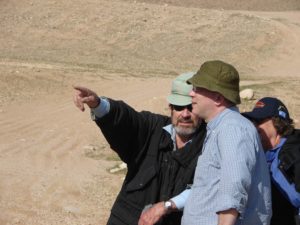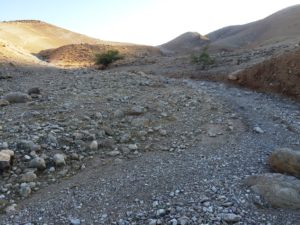Long before Dr. Ralph Hawkins stepped foot on the campus of Averett University, he found himself interested in sifting through the dirt along the banks of the Jordan River. Searching for what he wanted to believe in, Hawkins, a young college student with an impressionable future ahead of him, met a man named Adam. Throughout the next decade, Adam would become a close friend and mentor to Hawkins, as the two, along with others, explored the land where the biblical Israelites once lived.
The earliest known Israelite villages have been found in the highlands of ancient Canaan during the Early Iron Age (about 1200 B.C.) In the Bible, the Book of Joshua explains how they came from the east; the earliest settlements beginning in the Jordan Valley. Hawkins, in his quest for answers and spiritual growth, has traveled over to this area around 15 times over the years and will do so again this month, but this summer will be different.
Before Adam passed away two years ago, the two had spoken about excavating another area of land in the Jordan Valley. While Adam never made it there, Hawkins is finally making that dream a reality.
Adam never made it there, Hawkins is finally making that dream a reality.
“It’s a life-long dream to do this, to do this for him. I worked with him as a volunteer in my younger years and he took me under his wing. He valued my presence. After consulting with Adam, I wrote my dissertation on a site he excavated and it was published in 2012. He inspired me to do that,” said Hawkins, religion professor at Averett. “But now, I’m taking his work a step forward and I want to share that passion with the students here at Averett University.”
Eighteen students and volunteers from around the world and right here in Danville will be taking the trip with Hawkins this summer. The group will be going to Khirbet el-Mastarah, which has been established as a permanent village and may be one of the earliest Israelite settlement sites ever discovered.
Averett rising senior Rosie Anderson has never been to this area of the world before and wants to see the land of Jesus. Anderson says this is an opportunity for her to grow her relationship with God.
“I am looking forward to experiencing something new, learning about a different culture, and making new friends…It is always exciting to learn about how other people live, and it allows us to understand people better,” said Anderson. “I do not know what to expect from this trip…I will take away whatever God wants me to. I am pretty open about it, and I am willing to let the Holy Spirit guide me.”
After recent surveys, Hawkins says Khirbet el-Mastarah was found to have 54 new sites that may be connected to the early Israelites.
 The group will be in Israel during the month of June, excavating the site of Khirbet el-Mastarah and staying in Jerusalem – a short walk from the Old City, where the Garden of Gethsemane and the Church of the Holy Sepulcher are located. Students will also travel to the famous biblical sites of Jericho, the Dead Sea, Bethlehem, the Mt. of Transfiguration, the Sea of Galilee and Nazareth, the site of Jesus’ baptism.
The group will be in Israel during the month of June, excavating the site of Khirbet el-Mastarah and staying in Jerusalem – a short walk from the Old City, where the Garden of Gethsemane and the Church of the Holy Sepulcher are located. Students will also travel to the famous biblical sites of Jericho, the Dead Sea, Bethlehem, the Mt. of Transfiguration, the Sea of Galilee and Nazareth, the site of Jesus’ baptism.
“It’s a once-in-a-lifetime trip,” Hawkins said. “We will be excavating what may be one of the earliest Israelite sites in the land of Israel. It will be revolutionary to learn about their economy, society and culture; to hopefully enrich our understanding of these people and what happened back then.”
